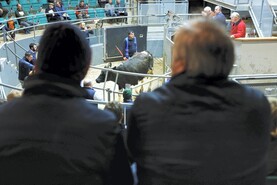The IFA, ICMSA and Macra na Feirme have all raised their concerns about the future of the dairy sector with An Taoiseach Micheál Martin and the Minister for Agriculture Charlie McConalogue today, Thursday 8 April.
While no specific case was mentioned, the concerns follow on from news that Glanbia plans to restrict milk supply from farmers at certain times of the year following thwarted plans to build a new processing facility.
The facility in question has been the subject of planning objections from the environmental group, An Taisce, resulting in serious delays.
“The Government must change our planning process to tighten up the basis on which judicial reviews can be taken. The current system is doing untold damage right across the economy,” IFA president Tim Cullinan said.
“Seventeen thousand dairy farmers in Ireland support over 40,000 indirect jobs across processing, haulage, sales and services. This employment is in areas throughout the country where employment prospects are limited and purchasing power is lower.”
The ICMSA president Pat McCormack said that the core problem was the position of the State.
“The State is not a referee here. The State has to set the overall direction and manage the sustainable development of our dairy sector. That means it has to decide those elements and then direct policy to support them. Several branches of the State gave permission for the Belview plant to proceed with onerous conditions attached but, it has been seriously delayed by a legal action,” McCormack said.
The State has to set the overall direction and manage the sustainable development of our dairy sector
Macra na Feirme president Thomas Duffy highlighted there was a risk in unintended consequences of imposing limitations on dairy farmers.
“As demonstrated by Teagasc figures, moving the supply of milk towards housed systems could increase emissions per kilo of milk by as much as 20%."
Investment
“Greater production of milk from the housed period will result in greater amounts of slurry, which despite significant investment by farmers in low emissions slurry spreading technology, will increase ammonia emissions,” according to Duffy.
“There is a legal right to make submissions, but the delayed nature of the entire planning process has meant that a delay is as good as a win and that must be addressed.”






 This is a subscriber-only article
This is a subscriber-only article










SHARING OPTIONS: